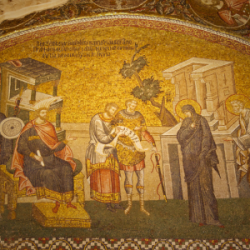Welcome readers! Please subscribe through the buttons on the right if you enjoy this post.

In both Matthew’s and Luke’s gospel we find the use of this saying attributed to Jesus:
“But he answered one of them, ‘I am not being unfair to you, friend. Didn’t you agree to work for a denarius? Take your pay and go. I want to give the one who was hired last the same as I gave you. Don’t I have the right to do what I want with my own money? Or are you envious because I am generous?’ So the last will be first, and the first will be last.” (Matthew 20:13-16)
“There will be weeping there, and gnashing of teeth, when you see Abraham, Isaac and Jacob and all the prophets in the kingdom of God, but you yourselves thrown out. People will come from east and west and north and south and will take their places at the feast in the kingdom of God. Indeed there are those who are last who will be first, and first who will be last.” (Luke 13:28-30)
Luke shares this saying in the context of the sayings we’ve been considering over the past few weeks. Matthew’s context is different and comes at the end of the parable of the landowner who chooses to pay all of that day’s workers the same full day’s wage regardless of how many hours they had worked:
“For the kingdom of heaven is like a landowner who went out early in the morning to hire workers for his vineyard. He agreed to pay them a denarius for the day and sent them into his vineyard. About nine in the morning he went out and saw others standing in the marketplace doing nothing. He told them, ‘You also go and work in my vineyard, and I will pay you whatever is right.’ So they went. He went out again about noon and about three in the afternoon and did the same thing. About five in the afternoon he went out and found still others standing around. He asked them, ‘Why have you been standing here all day long doing nothing?’ ‘Because no one has hired us,’ they answered. He said to them, ‘You also go and work in my vineyard.’ When evening came, the owner of the vineyard said to his foreman, ‘Call the workers and pay them their wages, beginning with the last ones hired and going on to the first.’ The workers who were hired about five in the afternoon came and each received a denarius. So when those came who were hired first, they expected to receive more. But each one of them also received a denarius. When they received it, they began to grumble against the landowner. ‘These who were hired last worked only one hour,’ they said, ‘and you have made them equal to us who have borne the burden of the work and the heat of the day.’ But he answered one of them, ‘I am not being unfair to you, friend. Didn’t you agree to work for a denarius? Take your pay and go. I want to give the one who was hired last the same as I gave you. Don’t I have the right to do what I want with my own money? Or are you envious because I am generous?’ So the last will be first, and the first will be last.” (Matthew 20:1-16, emphasis added.)
In Matthew, “the last will be first and the first will be last” is not a reversal of fortunes as in Luke 6 where the poor are blessed and the rich are cursed. It’s not a revolution that only proves to create a new hegemony with a new status quo someone’s still dominating and someone else is still being subjugated. It instead describes a movement toward equality and equity. Everyone is paid based on their need, not whether they were able to find work. In Jesus’ story, those who came last did not arrive late because they did not want to work, but because “no one hired us.” They could not find any work. Nonetheless, the landowner paid every worker the same wage regardless of how many hours they had labored: payment rooted in compassion and not the dispassionate capitalism of some winning because others lose. In this parable, the owner’s compassion was proportionate to every person’s ability and need.
That part of the last/first saying seems to contrast with the “rule” quoted later in the New Testament: “The one who is unwilling to work shall not eat” (2 Thessalonians 3:10). Many often miss the word “unwilling,” and misquote the statement as “those who don’t work shouldn’t eat.” However, youth, elderly people, people with disabilities, and those who simply can’t find work aren’t addressed by the saying in Thessalonians. They are included in the story Jesus told, where people are paid according to their need and each contributes what they are able. Also, not every disability is visible and some people are too often grouped in with the “unwilling to work” when in fact those who can work are called to take care of them as well. Peter Kropotokin describes in the book Mutual Aid what we see among the “fittest” societies in nature. He also unknowingly described the world Jesus was inviting us to create.
“While [Darwin] was chiefly using the term [survival of the fittest] in its narrow sense for his own special purpose, he warned his followers against committing the error (which he seems once to have committed himself) of overrating its narrow meaning. In The Descent of Man, he gave some powerful pages to illustrate its proper, wide sense. He pointed out how, in numberless animal societies, the struggle between separate individuals for the means of existence disappears, how the struggle is replaced by co-operation, and how that substitution results in the development of intellectual and moral faculties which secure to the species the best conditions for survival. He intimated that in such cases the fittest are not the physically strongest, nor the cunningest, but those who learn to combine so as mutually to support each other, strong and weak alike, for the welfare of the community. ‘Those communities,’ he wrote, ‘which included the greatest number of the most sympathetic members would flourish best, and rear the greatest number of offspring’ (2nd edit., p. 163). The term, which originated from the narrow Malthusian conception of competition between each and all, thus lost its narrowness in the mind of one who knew Nature.” (Mutual Aid: A Factor of Evolution, Chapter 1)
As Kropotkin did years later, Jesus described a society where members could “learn to combine so as mutually to support each other, strong and weak alike, for the welfare of the community.” These are communities where those who are able to support and care for those who are not.
The last/first saying also confronts us with something more familiar: an economy where there are more people who are willing to work than there is work available. Economies that keeps workers desperate are structured that way by design. The supply of jobs is low so that workers don’t get too picky or organize into labor unions. They don’t ask for better wages. They are simply desperately happy to find anything. They are just happy to have a job, like the people in the Hebrew story of Joseph: We’ll sell ourselves into slavery if need be, we just need to eat/survive. (See Genesis 47:25)
Testifying before the US Senate Committee on Banking, Housing, and Urban Affairs, on February 26, 1997, Alan Greenspan described that state of job desperation in the US as good for the economy [rather than an evil]. It was good for the corporate elites and created an imbalance of power where elites could control the working masses and expect greater passivity regarding low wages and poor working conditions.
“A typical restraint on compensation increases has been evident for a few years now and appears to be mainly the consequence of greater worker insecurity. In 1991, at the bottom of the recession, a survey of workers at large firms by International Survey Research Corporation indicated that 25 percent feared being laid off. In 1996 . . . the same survey organization found that 46 percent were fearful of a job layoff. The reluctance of workers to leave their jobs to seek other employment as the labor market tightened has provided further evidence of such concern, as has the tendency toward longer labor union contracts. For many decades, contracts rarely exceeded three years. Today, one can point to five-and six-year contracts—contracts that are commonly characterized by an emphasis on job security and that involve only modest wage increases. The low level of work stoppages of recent years also attests to concern about job security. Thus, the willingness of workers in recent years to trade off smaller increases in wages for greater job security seems to be reasonably well documented.”
Make laborers’ situation desperate enough and they will work forty or more hours a week and still not be able to feed their families, all while not organizing for higher wages and being content to have one of the few jobs available. In 2017, the Washington Post published that there is not one state in the US where a 40 hours a week (full-time), minimum-wage worker can afford a 2-bedroom apartment. Let that sink in. Not one. There are people working full time who cannot even afford a place to sleep. And a one-bedroom apartment can only be afforded in 12 counties located in Arizona, Oregon and Washington states.
The late Peter Gomes calls us to see the unfairness of these rules and to make instead a world characterized by distributive justice among those who, in our story, are first or last in our economic status quo. In The Scandalous Gospel of Jesus, Gomes writes:
“It is interesting to note that those who most frequently call for fair play are those who are advantaged by the play as it currently is, and that only when that position of privilege is endangered are they likely to benefit from the change required to ‘play by the rules.’ What if the ‘rules’ are inherently unfair or simply wrong, or a greater good is to be accomplished by changing them? When the gospel says, ‘The last will be first, and the first will be last,’ despite the fact that it is counterintuitive to our cultural presuppositions, it is invariably good news to those who are last, and at least problematic news to those who see themselves as first. This problem of perception is at the heart of a serious hearing of what Jesus has to say, and most people are smart enough to recognize that their immediate self-interest is served not so much by Jesus and his teaching as by the church and its preaching. Thus, it is no accident that although Jesus came preaching a disturbing and redistributive gospel, we do not preach what Jesus preached. Instead, we preach Jesus. Desmond Tutu is fond of the African proverb that says that when the white Christians came to Africa they had the Bible and the Africans had the land. “Then,” he says, “the Africans were given the Bible and the white Christians took the land.” The legacy of worldwide colonialism is in many cases the pacification of a culture by the Bible and the misappropriation of that culture by those who use the Bible as an instrument of control. For the Bible to be seen as an instrument of control rather than as one of liberation is to do violence to the substance of the Bible, but it is reassuring to those in whose interests the status quo stands. Why? Because the risk of displacement and transformation is too great. If the first shall be last and the last first, what happens to all of us who have spent every waking hour devising stratagems either to remain first or to become first?” (The Scandalous Gospel of Jesus, pp. 42-44)
Since 1978, the salaries of those at the top have risen over 937% while workers’ wages have only increased an average of 10.2%. The labor of the working class has been exploited to make those at the top incredibly wealthy in the name of efficiency and customer satisfaction. There are now few protections against making the masses fully dependent on corporations for their survival. Those who know their labor history resonates deeply with the hope of equity for those who are presently last with those now first.
What would it look like for us to work toward a world shaped by equity, compassion, supplying needs, and thriving, even for the least of these?

















